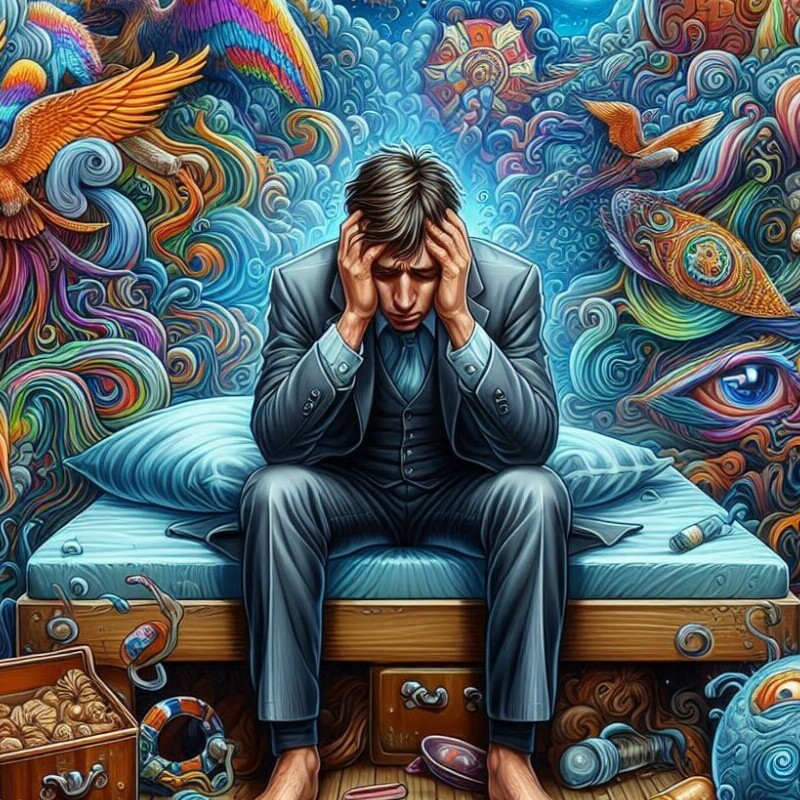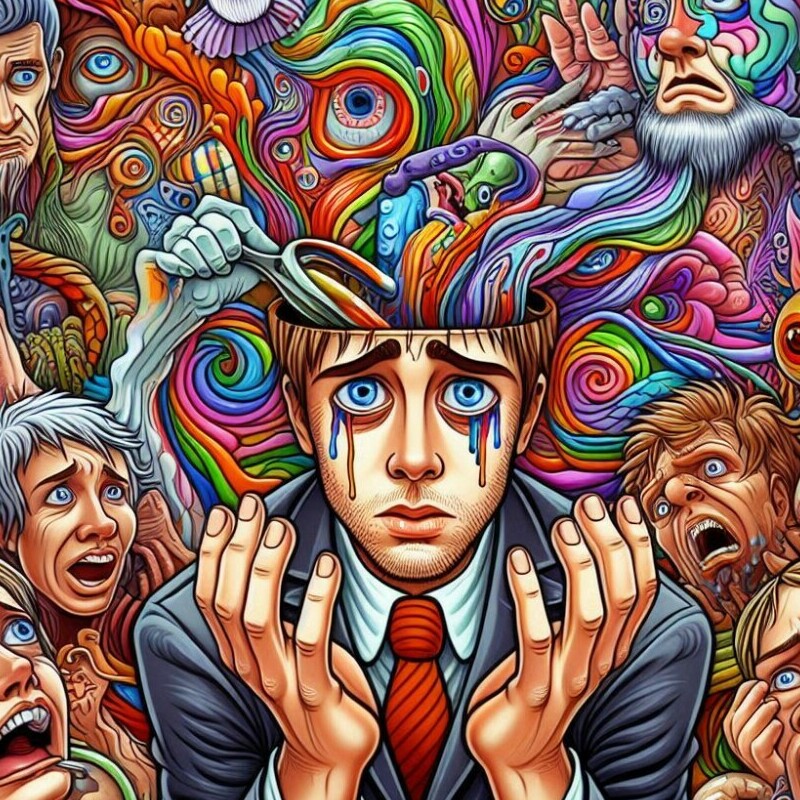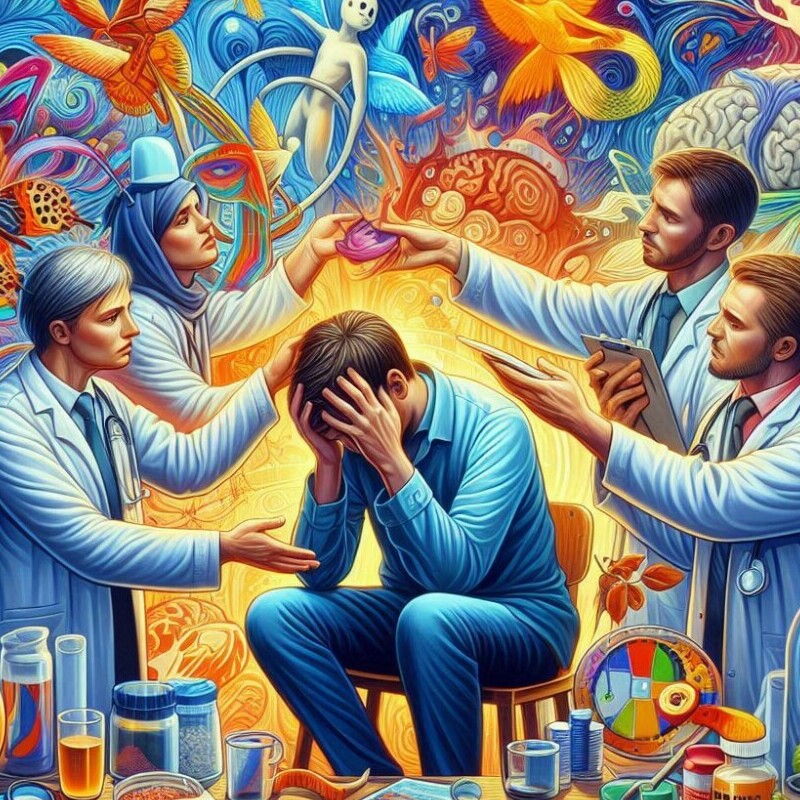
When we talk about delusional behavior, we’re focusing on a complex psychological phenomenon. Delusions are firmly held beliefs in things that are not real or true, despite evidence to the contrary. It isn’t just about having an occasional odd thought; it’s about persistent beliefs that remain unchanged even when reality is pointed out.
Let’s talk about the two primary symptoms of delusional behavior. Firstly, there’s an unwavering belief in the delusion itself, which can manifest in various themes like grandiosity or persecution. Second, there’s the resulting impact on behavior, with actions deeply influenced by these incorrect beliefs. It’s important to differentiate these genuine delusions from mere misconceptions, which are based on incorrect information but can be corrected with facts.
Now, why does this matter? Recognizing and understanding delusional behavior is crucial because it’s often an indicator of underlying mental health issues that need addressing. It’s vital for getting the right help and support; for the individual and their loved ones.
Delusional behavior doesn’t exist in a vacuum. It often interacts with a range of mental health conditions, creating a complex tapestry of symptoms. For instance, you’ll see how delusions can be part of the picture in disorders like obsessive-compulsive disorder (OCD).
Delusional Behavior and Obsessive-Compulsive Disorder (OCD)
I’m going to take you into the realm where obsessions meet delusions. Imagine your mind trapped in a loop of repetitive thoughts and irrational beliefs that feel very, very real. That’s the world some individuals with OCD live in where delusional thoughts add to their challenges. We’re talking about a space in mental health where OCD intersects with delusional behavior, and this complex relationship is what I want to help you understand.
OCD isn’t just about liking things orderly or being overly clean; it can include severe and persistent delusions. These are false beliefs that someone might hold, even when there’s clear evidence against them. We often see these manifest as irrational fears or obsessions that an individual feels compelled to act upon, no matter how illogical they may be.
Now, treatment for OCD that involves delusions isn’t one-size-fits-all. It’s a careful blend, often with a side of medications like SSRIs to manage serotonin levels, which can impact both obsessive thoughts and delusions. Yet, medications alone aren’t the answer. That’s where cognitive-behavioral therapy (CBT) and Exposure and Response Prevention (ERP) come in, two therapeutic strategies that help patients confront their delusions and compulsions, disempowering them over time.
You’re going to find heartening stories in the case studies that showcase triumphs over delusional OCD. People just like you and me, reclaiming their lives from the grasp of these intrusive thoughts. In my view, these stories aren’t just inspiring; they’re a testament to the resilience of the human spirit and the effectiveness of targeted treatment.
Understand that the road to managing OCD with delusional traits is a marathon, not a sprint. But with each step—each therapy session, each dose of medication, each moment of understanding from loved ones—a person can get closer to regaining control. And as we transition into the next section, it becomes clear that delusional behavior doesn’t discriminate; it weaves into the fabric of other disorders, such as bipolar and anxiety disorders, creating a pattern that’s as unique as it is challenging.
Delusional Behavior in the Context of Bipolar and Anxiety Disorders

Understanding the symptoms of delusional behavior is crucial for early identification and effective intervention, as it plays a vital role in the management of various psychiatric disorders, including schizophrenia, delusional disorder, and bipolar disorder with psychotic features.
Have you ever wondered if there’s a connection between delusional behavior and mood disorders like bipolar disorder, or even anxiety disorders? Guess what? There is. Both bipolar and anxiety disorders can present symptoms that overlap with delusional thinking, which complicates the diagnosis and treatment process. In bipolar disorder, delusions can manifest during extreme mood states, both manic and depressive, adding a complex layer to an already challenging condition.
During manic episodes, a person might believe they have superhuman abilities or possess significant wealth, power, or influence. These beliefs, while unfounded, feel as real as anything to the person experiencing them. On the flip side, a depressive episode may precipitate delusions of guilt or worthlessness, leading to an intense and distorted sense of reality.
As for anxiety disorders, it’s not just about feeling nervous or worried. High levels of anxiety can sometimes escalate into delusional thinking. People might become convinced that their anxiety-provoking thoughts are true, despite evidence to the contrary. This can be incredibly distressing and hinder their ability to function day-to-day.
But here’s the good part: there are treatment strategies specifically designed to manage these symptoms. These often include a combination of medication, like mood stabilizers or antipsychotics, and psychotherapy. For bipolar disorder, psychoeducation and mood monitoring become key to helping patients recognize and manage their symptoms. Cognitive-behavioral therapy (CBT) is exceptionally useful in treating anxiety disorders, helping patients to challenge and reframe their delusional thoughts.
In helping those around us who might be struggling with these conditions, what’s crucial is patience and empathy. Listen without judgment, and encourage professional help. Your support can make a significant difference in their journey toward stability.
This isn’t just about managing the medical aspect, though. It’s also about looking after the emotional well-being of the person affected. Delusional thinking, especially when linked to mood or anxiety disorders, can be isolating and frightening. Being there for someone, offering a stable and understanding presence, can be as valuable as the medical interventions themselves.

Delusional disorder can feel like an insurmountable wall, not just for those experiencing it, but also for their loved ones. But it’s crucial to remember that there are effective pathways to management and recovery. We’ve covered diverse symptoms that pose challenges, yet the goal is not out of reach.
Treatment typically blends medication with various forms of psychotherapy. Antipsychotics may be prescribed, aimed at reducing or eliminating delusional thoughts. It’s vital to work with a healthcare professional to tailor the medication approach, as individual needs and responses vary greatly.
Psychotherapy can be incredibly beneficial, providing individuals with strategies to understand and deal with delusional thoughts and behaviors. Techniques like cognitive-behavioral therapy (CBT) help in reshaping thought patterns and perceptions, often with significant improvements in quality of life.
Just as crucial is the support outside the therapist’s office. I’m talking about building a solid support network, including friends, family, and support groups. This network can provide continuous encouragement and aid in navigating daily challenges.
In the journey towards recovery, we must also confront societal stigma. It can add layers of complexity to treatment by imbuing feelings of shame and isolation. By promoting education and awareness, we can foster a more understanding environment that empowers those affected to seek help without fear of judgement.
Delusional disorder, like any health issue, affects the whole person. That’s why treatment isn’t just about symptoms; it’s about providing the patient with holistic care that encompasses mental, emotional, and social health. Tailoring treatment plans, ensuring the dignity of the individual, and fostering a supportive community are all steps towards a hopeful horizon.
Through increased awareness and understanding, healthcare professionals, caregivers, and society as a whole can contribute to more effective support and treatment strategies. By addressing the underlying causes and manifestations of delusions, we can help individuals achieve better mental health outcomes and improve their overall quality of life.
Kindly share your comments and experiences below.
Simplified. Turn YOUR Passion, Hobby or Interest into YOUR Success Story! Join Wealthy Affiliate today: https://www.
**Here’s a little transparency: Our website contains affiliate links. We may receive a small commission if you click and make a purchase. Don’t worry, as there’s no extra cost to you. It’s a simple way to support our mission of bringing you quality content.
Follow me on social media!

hey this article on delusional behavior is insightful, especially in highlighting how persistent, unfounded beliefs can significantly impact an individual’s actions and mental health. I’m curious about the intersection with OCD how do delusional thoughts specifically exacerbate the symptoms of OCD, and what are some real-life examples of this interplay? Also, when discussing treatment options, what are the success rates of combining medication with CBT and ERP in managing these conditions? It’d be great to hear more about patient experiences and outcomes.
Hello,
Thank you for your comments and insights on the article.
Delusional thoughts can indeed exacerbate OCD symptoms by reinforcing obsessive worries and compulsive behaviors. Consider the possibility that an OCD sufferer would believe their hands are always dirty, which would cause them to wash their hands excessively.
Success rates in managing these conditions have been shown to be high by combining medication with cognitive behavioral therapy (CBT) and exposure and responsive therapy.
Some patients have achieved substantial symptom relief, while others report significant improvement.
Sharing more patient experiences and outcomes can provide valuable insights into the effectiveness of these treatments.
I appreciate your contributions and support.
Regards,
Makinde
great article, I was just asking myself what are the most common symptoms and signs of delusional behaviour, and how can they be identified in individuals, how different types of delusions (e.g., persecutory, grandiose, somatic) manifest in people’s behaviour and thinking patterns and what are the potential causes and risk factors for developing delusional behaviour, and how can it be effectively treated or managed? Thank you.
Hi Live Free Team,
I appreciate your contributions to the article.
Some common signs and symptoms of delusional behaviour are: paranoia or mistrust of others, difficulty distinguishing between reality and fantasy, strongly held beliefs despite evidence to the contrary, withdrawal from social interactions, etc.
Each type of delusion has it’s own unique mode of manifestation; persecutory delusion: believe that one is being cheated, harassed or persecuted causing suspicion and mistrust, grandiose delusion: belief in one’s extraordinary importance and leading to exaggerated self-importance, and somatic delusion: belief in having a medical condition leading to obsessive health concern, despite medical reassurance.
Psychological stress condition, pre-existing mental health condition, genetic and neurochemical imbalances remain some of the factors that cause this health condition.
Support system, therapy, medication, and sometimes hospitalization are some of the effective management procedures for this state of health.
Thank you for your insight and support.
Regards,
– Makinde